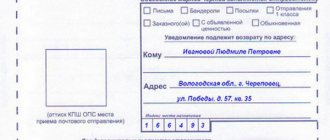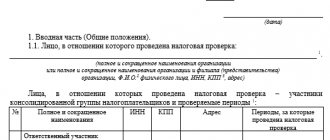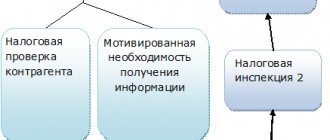How are the terms of an on-site inspection calculated? Why might a check be suspended? Is it possible to cancel a decision just because deadlines are not met? What additional charges can be challenged in such cases? And when does delaying the audit period play into the hands of the taxpayer? Read the answers to these questions below.
To begin with, let us remind you how the Tax Code limits inspectors in terms of deadlines.
On-site tax audit in 2022: list of features
If you or your organization has become the object of attention of the tax authorities and received a notification of an on-site tax audit in 2021, you need to familiarize yourself with the features of such an audit:
- An on-site tax audit can be carried out only at the location of the taxpayer (except for the cases specified in paragraph 2, 3, paragraph 2 of Article 89 of the Tax Code of the Russian Federation);
- the main purpose of the audit is to establish whether taxes and insurance premiums were calculated correctly, and whether they were paid on time (clauses 4, 17 of Article 89 of the Tax Code of the Russian Federation);
- the main document confirming the start of an on-site tax audit is the decision to conduct it (clause 1 of Article 89 of the Tax Code of the Russian Federation);
- the period under review cannot exceed 3 years (clause 4 of Article 89 of the Tax Code of the Russian Federation);
When a tax audit can cover a period exceeding 3 years, read the materials “A repeated on-site audit can be “deeper” than 3 years” and “Can the current year be checked along with the previous three?”
- a taxpayer cannot be audited more than once for the same taxes for the same period;
There are several situations - exceptions when the Tax Code allows repeated inspections. All of them are described here. Let us note a new one that has appeared since 07/01/2021 - this is the submission of clarification on VAT or excise taxes with an increase in the amount of tax to be reimbursed (clause 10 of Article 89 of the Tax Code of the Russian Federation as amended by Law No. 470-FZ dated December 29, 2020).
- only one on-site inspection can be carried out per calendar year (with the exception of when the decision to repeat the inspection is made by the head of a higher tax authority of the Federal Tax Service of the Russian Federation);
- an on-site inspection cannot be assigned in relation to a special declaration (clause 2 of Article 89 of the Tax Code of the Russian Federation), which an individual has the right to voluntarily submit to the Federal Tax Service about the property he has (real estate, transport, deposits in banks or in the authorized capital of organizations), as well as about foreign companies controlled by him.
The right of the Federal Tax Service to an on-site inspection
It is legally determined that the right to conduct an on-site tax audit has the tax authority to which the taxpayer belongs territorially. Although there are exceptions that apply to the largest taxpayers and separate divisions.
Also important are the date of registration as a taxpayer with a particular tax authority and the date of amendments to the accounting register.
Thus, if, when changing location, the corresponding changes are not made to the Unified State Register of Legal Entities in a timely manner, then an on-site tax audit will be carried out by the tax authority at the previous location. If such a situation arises due to the fault of the tax inspectorate in connection with violation of registration requirements and deadlines, then an on-site tax audit will also be carried out by the inspectorate at the old place of registration (Resolution of the Federal Antimonopoly Service of the Volga District dated May 29, 2013 No. A65-25327/2012).
Other Federal Tax Service Inspectors do not have the right to order inspections of taxpayers located outside their jurisdiction. Thus, the tax authority, which only registers real estate and transport, but not the taxpayer himself, cannot assign the latter an on-site tax audit.
According to what criteria does the Federal Tax Service select taxpayers to conduct an on-site audit, ConsultantPlus experts told. Get a free trial and learn from authoritative content.
Decision to conduct an on-site tax audit
As noted above, the start of an on-site tax audit is preceded by the preparation of the main document giving the right to conduct a control event - the decision to conduct an on-site tax audit and, accordingly, its delivery to the inspected legal entity or individual.
This document should be given special attention, as it is the basis for implementing a set of control measures. Often, incompetent inspectors neglect the duty to timely serve and familiarize taxpayers with the decision, but this is a serious mistake and can be used by the persons being inspected as an argument when confirming a violation of procedural norms.
The decision to conduct an on-site tax audit has the right to be made only by the tax authority to which the taxpayer being audited territorially belongs. This document reflects information about the subject of control, the subject of the audit (list of taxes being audited), the audit period and the composition of the audit team. The decision must be signed by the head of the tax office or his deputy.
Counter checks
Counter checks are regulated by Art. 93.1 Tax Code of the Russian Federation. There is only one thing we can add about them: in case of internal taxation, counter-inspections are carried out to confirm specific transactions for which violations have been identified, because all other counter-inspections have already been done as part of the pre-inspection analysis.
Counter checks also include international requests, which are carried out only within the framework of the GNP due to the time it takes to receive a response to them. International requests are sent to the Federal Tax Service based on the reasoned conclusion of the inspection agency conducting the inspection.
This conclusion indicates all the activities and actions of the inspectors carried out to collect the evidence base. The inspectors must convince the Federal Tax Service that on the territory of the Russian Federation all actions regarding the identified violations have been carried out in full and they cannot do without information from other states. As a rule, when sending such requests, the Federal Tax Service makes a decision on the extension of the GNP.
Where is an on-site tax audit carried out according to the Tax Code of the Russian Federation?
The place for conducting an on-site tax audit is the premises or office of the taxpayer (Clause 1, Article 89 of the Tax Code of the Russian Federation). But sometimes it happens that the size of the premises does not allow the entire inspection team to be located there, and then the audit can be carried out at the tax office.
He must inform himself that the taxpayer does not have the ability to accommodate inspectors, otherwise this decision is made by the head of the inspection team upon visiting and inspecting the taxpayer’s premises.
It should be noted that in practice it happens that the tax authority, without receiving the relevant application and due inspection, decides to conduct an on-site tax audit at the inspectorate. But this indicates that the regulatory authorities are violating the current procedure for conducting on-site tax audits.
This opinion is also supported by the courts. Thus, the FAS Moscow District, in resolution dated August 20, 2010 No. KA-A40/8830-10, canceled the decision made based on the results of an on-site tax audit conducted in a simplified version due to a violation of the procedure.
But at the same time, if the decision of the tax authority does not contain significant errors, then the courts are unlikely to side with the taxpayer just because an on-site tax audit was carried out at the tax office without appropriate notification of the person being inspected (resolution of the Federal Antimonopoly Service of the West Siberian District dated April 26. 2013 No. A75-3810/2012).
An important circumstance is that even when conducting an on-site tax audit on the territory of the regulatory authority, the taxpayer must comply with all the requirements of the inspectors, be it a request to submit documents or a requirement to inspect work premises.
Individual verification
If the inspection is carried out against an individual, including one who has lost the status of an individual entrepreneur, who does not agree to allow inspectors into his apartment, then the inspectors will carry out control activities on the inspection territory.
Access of tax officials conducting tax audits to residential premises, in addition to or against the will of the people living in them, other than in cases established by federal law or on the basis of a court decision is not allowed. Such clarifications were provided by the Ministry of Finance in letters dated November 14, 2022 No. 03-02-08/87997, August 31, 2017 No. 03-02-08/55972.
Read on the website
On-site tax audit: what periods are checked?
How long does an on-site tax audit take?
The term of an on-site tax audit is 2 months, but at the same time, the Tax Code of the Russian Federation gives the tax authorities the opportunity to both extend it and suspend it. Inspectors very often use these opportunities when they need to find out whether a certain business transaction is a violation, or to study additional materials relating to the activities of the person being inspected.
For information on cases when tax authorities can extend the period of an on-site audit, read the material “How and when an on-site tax audit can be extended .
The period for which the inspector has the right to extend the inspection is 4 (6) months (clause 6 of Article 89 of the Tax Code of the Russian Federation), and to suspend it is 6 (9) months (clause 9 of Article 89 of the Tax Code of the Russian Federation). Thus, if during a control event tax authorities resort to the methods described above, then the maximum audit period can be 1 year and 3 months.
An exception is an on-site tax audit of a specific branch or representative office - it must be carried out within 1 month. In this case, the legislator granted controllers only the right to suspend.
The term of an on-site tax audit begins to be calculated from the day the decision to conduct this control event is made, and ends on the day a certificate is drawn up based on the results of the audit (the specified document must be delivered on the same day).
Therefore, we can highlight the main stages of the verification:
- commencement of an on-site tax audit (delivery of a decision to conduct it);
- verification process (maximum - 1 year 3 months);
- completion of the audit (drawing up a certificate of on-site tax audit).
Thus, within the deadlines indicated above, inspectors are required to carry out all planned activities, as well as those that arose during the inspection process. If inspectors received any evidence after the expiration of the deadline, then they do not have the right to attach it to the materials of the on-site tax audit (Resolution of the Federal Antimonopoly Service of the Far Eastern District dated May 26, 2009 No. F03-2248/2009).
It is also worth noting that such a violation does not imply the cancellation of the decision and the results of the on-site tax audit completely, since there is only one formal circumstance that can influence the court’s decision - this is a violation of the procedure for the participation of the taxpayer in considering the audit materials (paragraph 2, paragraph 14, art. 101 of the Tax Code of the Russian Federation).
The frequency with which tax authorities have the right to conduct on-site tax audits is described in the ConsultantPlus Ready Solution. Get trial access to the system and study the material for free.
More details about the timing of an on-site tax audit are described in the material “What is the deadline for an on-site tax audit?” .
Extension of the on-site inspection period
The Federal Tax Service of Russia, in a letter dated July 25, 2013 No. AS-4-2/13622 (clause 4.1), indicated that it is possible to extend the period for conducting an on-site inspection more than once. However, this requires compelling reasons, which are given in Appendix 4 to the order of the Federal Tax Service of Russia dated 05/08/2015 No. ММВ-7-2/ [email protected]
ConsultantPlus experts explained which on-site tax audits have special deadlines. Get trial access and upgrade to the Ready Solution for free.
In addition, the Tax Code does not establish restrictions on activities carried out during the period for which the audit is extended. Therefore, tax authorities are actively taking advantage of the opportunity to suspend on-site inspections. This is exactly the conclusion made by the authors of the letter of the Federal Tax Service of Russia for Moscow dated February 21, 2008 No. 16-27.
Example
To conduct an on-site tax audit of Omega LLC, a 2-month period was initially provided. However, after the initial study of the materials, by decision of the inspection management, the period was extended to 4 months. But then it turned out that information from contractors was needed. The tax authority suspended it after 3.5 months of inspection. From the point of view of the legality of the actions of the Federal Tax Service, there is no doubt.
However, tax authorities do not always have the right to an extension. These are the following cases:
- If an independent tax audit of branches or representative offices is carried out. For them, a period of one month is established, with exceptions to paragraph 7 of Art. 89 of the Tax Code of the Russian Federation does not provide for this.
- If an audit of a consolidated group of taxpayers is carried out. For them this period, according to paragraph 5 of Art. 89.1 of the Tax Code of the Russian Federation, should be no more than 2 months. It can increase for as many months as there are taxpayers in the group, not counting the responsible participant. But in any case, the total period should not be more than 1 year.
The Federal Tax Service of Russia, in a letter dated July 25, 2013 No. AS-4-2/13622 (clause 4.1), analyzed this rule and indicated that the inspection period for the Group of Taxpayers was initially set and cannot be extended.
How will the on-site inspection end?
On the last day of the audit, tax officials draw up a certificate of the audit and hand it over to the taxpayer. Over the next two months, they issue an on-site inspection report. To prepare an act for a consolidated group of taxpayers, 3 months are allotted for drawing up an act. The report and the documents attached to it are also handed over to the taxpayer.
If the person being inspected has objections, he has the right to send them to the Federal Tax Service for consideration within a month. See the objection form here. If no objections are received, tax officials begin to review the case materials and make a final decision.
Read more about the procedure for processing tax audit results in the section of the same name.
Notch
The seizure of documents and objects is regulated by Art. 94 Tax Code of the Russian Federation. The seizure is carried out on the basis of a reasoned resolution of the employee of the VNP department conducting the inspection, which is approved by the head (deputy) of the Federal Tax Service. The seizure is carried out independently by inspectors or with the involvement of law enforcement officers.
Documents and items related to the inspection are subject to seizure. Excavation is carried out for the following reasons:
- the person being inspected refuses to voluntarily provide documents and items for inspection;
- inspectors have concerns that documents may be destroyed, replaced or corrected; original documents are necessary for the examination.
The seizure is carried out only during the daytime in the presence of representatives of the person being inspected and witnesses.
During the seizure, a protocol is drawn up that describes everything that is seized, indicating the name, quantity and value of the items. When documents are seized, copies are made of them, which are certified by inspectors and handed over to the taxpayer being audited. Copies of documents are transferred on the day of seizure or within 5 days after seizure. All seized documents must be presented to witnesses, laced, numbered and sealed by the person being checked. The second copy of the seizure protocol is handed over to the taxpayer against signature.
Results
The purpose of a tax audit is to monitor the correctness of calculation and payment of taxes. The procedure for conducting an on-site tax audit is regulated by Art. 89 Tax Code of the Russian Federation. The results of an audit can be canceled only in cases of significant violations on the part of the tax authority, for example, if the taxpayer is not given the opportunity to participate in the consideration of the audit materials and provide explanations.
Sources:
- Tax Code of the Russian Federation
- order of the Government of the Russian Federation dated March 18, 2020
You can find more complete information on the topic in ConsultantPlus. Free trial access to the system for 2 days.
Suspense
In addition to extending the audit, the tax authority may decide to suspend it. This right is given by paragraph 9 of Article 89 of the Tax Code of the Russian Federation. This applies to both inspections of the main organization and inspections of divisions. Suspension means that the GNP is interrupted for a certain period of time, and then resumes again. For example, the audit was carried out over a period of one month. Further, a decision was made to suspend it for 15 days. After 15 days, the inspection continues, while the Federal Tax Service specialists have one more month before its completion.
The total period of suspension of an on-site tax audit (maximum possible) is six months. So it turns out: 6 months of verification + 6 months of suspension = 1 year . An on-site inspection can last exactly that long, and not a day more. The period is calculated from the date of the decision on the inspection until the date of drawing up the certificate of completion of the inspection.
What can and cannot inspectors do during a suspension? The answer is contained in paragraph 9 of Article 89 of the Tax Code of the Russian Federation and is explained in letters of the Federal Tax Service dated November 21, 2013 No. ED-3-2/ [email protected] and dated July 25, 2013 No. AS-4-2/13622. The inspectors must vacate the taxpayer's territory, return to him all original documents, except those seized during seizure, and also stop requiring the submission of new documents. The Federal Tax Service clarifies that during the period of suspension, inspectors are prohibited from seizing documents and items, inspecting, taking inventory, and studying documents on the taxpayer’s territory.
At the same time, inspectors have the right to carry out actions during the suspension that are not related to being on the territory of the inspected entity. The Ministry of Finance believes that this does not contradict the Tax Code (letter dated 05/05/2011 No. 03-02-07/1-156). For example, inspectors may send requests to third parties to provide information on the taxpayer being inspected.
Often during a suspension, inspectors interrogate witnesses. However, whether this is legal or not is a moot point. Such actions become the object of complaints from audited taxpayers.






